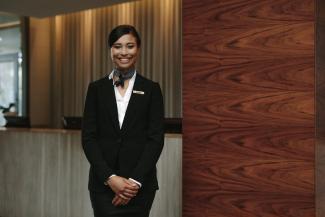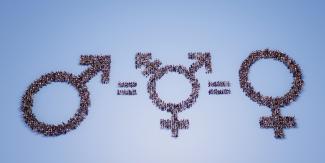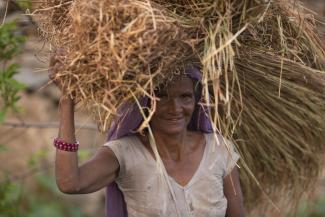
Every gender deserves work free of inequality
Gender inequality is pervasive at different levels in society and the workplace is one of the key sources. This can be seen particularly in the level of the professional activities offered, the remuneration awarded and life in the company itself. What steps can be taken to move towards greater fairness? Researchers at Université Paris-Saclay are looking into this issue.
In recent years, gender issues have become more prominent. For a long time, gender has been confused with biological sex, which concerns a person's anatomy, but it is first and foremost a constructed sexual identity and above all a social relationship based on domination. These issues are now at the heart of debates and several social advancements, although much remains to be done in this area. Paid work, which has long been considered to be the main route for the emancipation of women as it allows them to leave the domestic sphere, has become a space where sex and gender inequalities persist. These inequalities have even been transformed and adapted to the different forms which work takes. How is this manifested in reality?
In their work, researchers from Université Paris-Saclay report strong trends, such as the control of women's bodies through social norms, the overlapping between professional and personal life and the increase in inequality due to ethnic origin. In response, the scientists are proposing new ways of managing and organising work because here too, research as well as action is needed.
The control of women’s bodies
Gender inequality is the reduction of a body to its social norms. In the case of hostesses, Gabrielle Schütz from the Professions, Institutions, Temporalities laboratory (PRINTEMPS – Univ. Paris-Saclay, UVSQ, CNRS), talks about ‘female employment for show’. The majority of reception work is carried out by women. Less than 10% of the workforce is male. This work is still associated with so-called ‘feminine’ skills. Empathy, attention to the needs of others and diplomacy are all qualities traditionally attributed to a feminine nature and are preferred for working in hospitality.
Two elements are mainly expected in this profession - you must be able to host and to sell. “Hostesses are expected to behave like the lady of the house and welcome visitors as if they’re their guests,” explains Gabrielle Schütz. Selected on the basis of attractive physical criteria and having to meet very precise dress requirements, hostesses are seen as decorations designed to promote sales.
However, in this sector, gender inequality is also apparent in the fact that men are not restricted to the same tasks as women. “Men are recruited and assigned tasks based on supposedly masculine qualities, such as strength, persuasiveness and authority,” reveals Gabrielle Schütz. More often than not, men are placed outside and in the event car park in particular, where they valet, guard the guests' luxury cars or simply give directions.
In an even more extreme way, the constraints are sometimes even reflected in the way bodies are allowed to move. According to Anaïs Bohuon from the Complexity, Innovation, Motor and Sports Activities laboratory (CIAMS – Univ. Paris-Saclay, Univ. d’Orléans), who is the coordinator of Gender Equality at Université Paris-Saclay and co-director, together with Catherine Descours, of the Harassment unit, women’s and girls’ bodies have not been allowed to move in the same way throughout the history of physical activity and sport. Women's physical expression has long been directed towards artistic disciplines and gymnastics which require grace, flexibility and other traditional criteria of femininity. Many studies justify this limitation by means of a 'differentialist' view of women's bodies. “This differentialist concept essentialises and naturalises women's bodies. It assumes that there are biological differences that are unending. It encourages women to move their bodies while respecting the biological differences linked to their sex which are considered impassable,” outlines Anaïs Bohuon. The lecturer puts forward an alternative to this view. Through her research, she is trying to show how muscles have created 'sex' and consequently a certain contemporary definition of sexual difference. She talks of the ‘social production of performance’ in that social, cultural, economic, environmental, political and genetic factors form a complex and inseparable whole in explaining performance in sport.
Numerous scientific studies show the absolute necessity of taking into account the multiple aspects of biological sex and the difficulty of pinpointing a person's ‘true’ sex. This becomes impossible when people are found to be intersex. The large number of exceptions that challenge the assertion of feminine/masculine categorisation, whether in terms of genitalia (i.e. anatomy), gonads (testicles, ovaries) or chromosomes (XX or XY), evidences this. In addition, many biologists, sociologists and science historians have highlighted the impossibility of unequivocally determining the biological sex of all individuals, whether intersex or non-intersex. Explaining sports differences solely in terms of biology is very simplistic. For Anaïs Bohuon, performance also stems from social and historic factors, and bodies are social markers shaped by the way they are used.
Divergent views and feelings depending on the area of activity
As part of a survey conducted by a group of sociologists, Muriel Mille, who is from the PRINTEMPS laboratory and who was involved in the survey, points out that although male and female family law judges make the same decisions, they do not carry out their role in the same way. This is because, in general, men and women do not have the same career path before attaining this type of position.
The male judges involved in the survey came to family law late in life as it was often a necessary step in the advancement of their careers. They sometimes end up refuting the legal purpose of this area. “For some judges, child-related issues, such as what time to pick up a child after school or the amount of child support, doesn’t involve legal reasoning which is sufficiently complex or abstract,” explains Muriel Mille. While the majority of male judges see family cases as a burden, female judges are attracted by the idea of making a direct impact on the lives of the children and litigants. The survey shows that most of the female judges interviewed are former juvenile judges who reuse the methods, attitudes and professional habits that they have already internalised. “They prioritise, for example, allowing the litigants to speak, creating a dialogue and taking the time to decide,” points out Muriel Mille.
For its part, the role of a hostess is at times undervalued. It is prone to part-time work, which is endured by those who aspire to full-time employment and a corresponding salary. The fact the work is outsourced creates a form of insecurity. “As they aren’t directly employed by the people they work for, hostesses must be able to make themselves valued by both the client and the service provider in order to continue to obtain work,” points out Gabrielle Schütz. They are then faced with contradictory demands, with the risk of the client turning against them. “There are in fact several people hiding behind the figure of the customer: the general services manager, the person in charge of reception services, the general manager of the company... All these people don’t necessarily agree with each other on what a good hostess is. However, the hostesses have to please all of them, in addition to the company which employs them, if they want to stay in their jobs,” explains the sociologist.
This devaluing of women's jobs is even more pronounced in some regions of the world. Social economist, Isabelle Droy from the Sustainability and Resiliency unit (SOURCE – Univ. Paris-Saclay, UVSQ, IRD), highlights the importance in developing countries of women's unpaid work in the daily functioning of family life. In rural areas, these tasks are often particularly time-consuming and arduous, such as collecting water and wood for fuel, and carrying out domestic chores. Activities also include looking after the children and elderly, as well as social activities. This work, which is essential for the functioning and continuation of societies, is often taken for granted, invisible and poorly measured. This is in addition to women's activities in the business sector, which in the vast majority of situations are carried out informally. While informal employment is in the majority for both men and women, for women it is often less well paid and more often in the form of self-employment. Because of this situation and their family obligations, women are also more vulnerable to economic upheavals such as financial crises or fluctuations in commodity prices, as well as pandemics such as the COVID-19 health crisis, or to wars which lead to interruptions in activities.
In addition, women have unequal rights of access to resources, such as access to land, of which they often only have usage rights. The rules of inheritance are very often unequal for girls - which is a real obstacle to getting out of this type of predicament. Isabelle Droy cites as an example the management of shea parks in Benin, and the gender inequalities which prevail there. The men control the land and the trees, while the women have use of the shea fruit, which they process for family consumption or sale. The work is hard and low-paid, but they need it because there are few alternatives. Without control over the management of the trees, the women are dependent on the men, who may decide not to protect this resource in favour of other plantations from which the women would not benefit
Differences in professional and personal timetables
Women in both northern and developing countries are mainly responsible for social reproduction activities (preparation of meals, cleaning, laundry, shopping, etc.), with varying degrees of responsibility in different countries. In developing countries, domestic tasks are more time-consuming and arduous. “In rural areas, water has to be fetched from several kilometres away and brought back in very heavy cans carried on the head. The same applies to energy, as the fuel used for cooking is often wood,” points out Isabelle Droy.
Neoliberal policies known as ‘structural adjustment’ also disrupt economies which are mainly based on family farming because they advocate economic models which are not adapted to developing countries. In these countries, the farming system is based on small farms, where a family works and consumes part of its output. This form of agriculture is now breaking down as poverty pushes many men to migrate to other regions and the workload of the women left behind is increasing to compensate for this absence.
When standard of living or social origin is a source of inequality
According to the group survey carried out in family courts in which Muriel Mille has been involved, the moment of separation reveals how often the incomes of men and women are unequal. When a heterosexual couple separates, the positions of the spouses are most often unbalanced and in 66% of cases, women initiate the claims. Finding themselves with sole custody of the children and with fewer resources, they have an immediate interest in initiating proceedings, especially as they are often encouraged to do so by institutions such as the Caisse d'Allocations Familiales (National Fund for Family Allowances).
The occupation of hostess also fosters an accumulation of inequalities. This glamorous profession has been shown to discriminate on the basis of skin colour. Gabrielle Schütz points to several examples where hostesses have been employed on the basis of their ethnic background. “During an event for BMW which marketed, among other things, MINIs, I attended a recruitment session where all the white hostesses were sent to BMW wearing pearl necklaces and navy blue suits, and the coloured hostesses to MINI wearing orange trousers and t-shirts. In BMW's words, they didn’t want to appeal to ‘suburban gangsters’, but to upper-middle class fathers.”
Towards new ways of organising work
Sex and gender inequalities have adapted to the COVID-19 pandemic and the widespread use of remote working. For Gabrielle Schütz, this manifests itself primarily in unequal access to remote working as an option as women are mostly engaged in activities, which require their physical presence, such as caring for, or greeting people. Remote working is also not synonymous with increased autonomy for women. “In subordinate jobs, which are more often female, the person is expected to be able to react by email or telephone,” explains the researcher. Even though women tend to be more likely to work remotely, the distribution of domestic tasks remains unequal. While women's emancipation used to involve finding work outside the home, their return to the domestic space through remote working raises questions for the researcher.
A more egalitarian organisation of work is, however, possible. This is based on the work of Léa Dorion from the Networks, Innovation, Territories and Globalisation laboratory (RITM – Univ. Paris-Saclay). Based on anarcha-feminism, the researcher proposes new, flatter, leaderless management structures, where all members are equal and decisions are made by consensus. These new models are called 'prefigurative'. “They are organised today in such a way as to prefigure the world they wish to see tomorrow. They try to align organisational tools with political goals.” Léa Dorion has taken a peek into the world of science fiction in order to imagine these alternative organisations. “Dystopias have already been used to show what can go wrong with business and capitalism in general. But there’s been little research on utopian narratives to see what this might mean in terms of creation and how to improve our organisational practices.”
The researcher also puts forward solutions for a more feminist business organisation. She offers managers practical tools to become, at their level, supporters of feminism. At a company level, she envisages four avenues for action, such as revising inequality indicators, better prevention and management of sexual violence, improving human resource management practices, and changing the corporate culture so that a sexist climate is no longer tolerated. To be consistent with a prefigurative vision, a feminist company is self-managed, the workers participate in decision-making and pay levels are fixed. “It’s not perfect because sexual harassment, a sexist climate or the domination of men over women may still exist, but we’re still removing a maximum number of factors which promote gender inequality,” says Léa Dorion in conclusion.
For widespread ‘empowerment’
Initiatives for a fairer transformation of labour have been implemented in developing countries and Isabelle Droy has been involved in several projects, such as RANO MANGA (Action research and participant observation for the co-construction of adapted governance models for the water and sanitation sector in Madagascar). This project is directly aimed at the integration of women in decision-making. “Many of the initiatives involve the installation of wells or water pumps. However, there’s a real problem in the management of these projects, which is entrusted to committees devoid of women. Since it’s the women who will collect the water, including them in decisions could improve things,” points out Isabelle Droy.
RANO MANGA is also part of an approach which is very widespread in feminist literature - namely ‘empowerment’. Léa Dorion suggests the following definition. “This process aims to acquire not power over others, but a creative, positive power to act.” Cases of ‘empowerment’ already exist. Anaïs Bohuon cites two sports associations by way of example. They are the Roller Derby and the Dégommeuses football team. They seek to include all sex and gender minorities in order to re-educate them to move their bodies beyond the dominant representations of the female body. As Léa Dorion explains “The idea of empowerment is anything but the oppression of others.” Feminism is therefore not exclusive. On the contrary, it is a starting point towards a more just and emancipatory system for all. “It’s by improving the living conditions of the most marginalised that we can improve those of the majority,” suggests the researcher.
References :
- G.Schütz. Jeunes, jolies et sous-traitées : Les hôtesses d’accueil. la Dispute. 2018.
- A. Bohuon et al. Performance sportive et bicatégorisation sexuée. Genèses. 2019.
- Le Collectif Onze, Au tribunal des couples, enquête sur des affaires familiales, Odile Jacob, paru, Novembre 2013
- Bessière C, Mille M, Le juge est (souvent) une femme. Conceptions du métier et pratiques des magistrates et magistrats aux Affaires Familiales, Sociologie du travail, n° 55, septembre 2013
- C. Bessière, S. Gollac et M. Mille. Féminisation de la magistrature : quel est le problème ?. Travail, genre et sociétés. 2016
- M. Flécher, H. Oehmichen, M. Mille et G. Schütz. Une clientèle envahissante ? Les temporalités des avocat·es en droit de la famille. La Nouvelle Revue du Travail. 2020.
- I.Droy & J.-É.Bidou. Sortir de l’invisibilité : Inégalités de genre dans les agricultures familiales en Afrique de l’Ouest. Mondes en développement. 2022.
- L. Dorion. L’entreprise du XXIe siècle sera féministe. Dunod. 2021.





